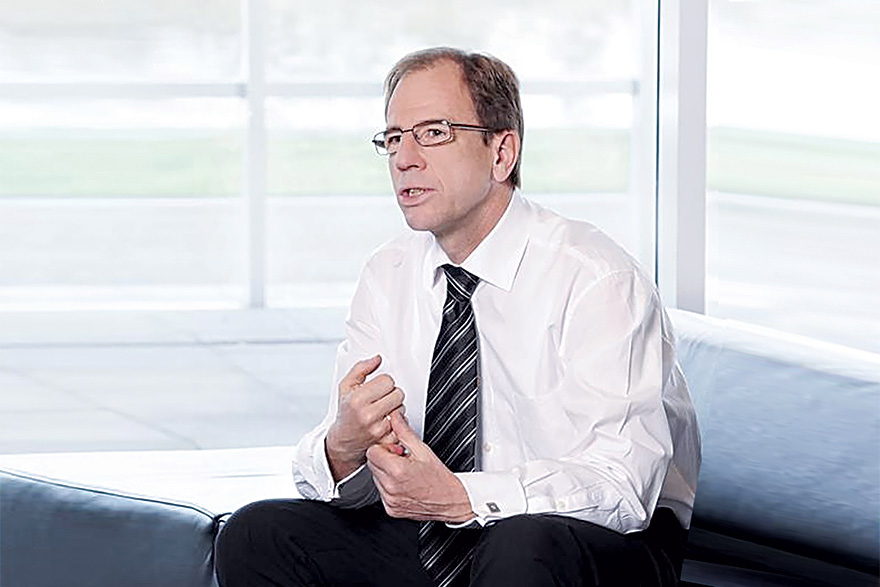Semiconductors play a key role when it comes to industrial power control, the energy management of electronic devices, running energy efficient server farms as well as in the area of digital security solutions.
When Dr Ploss started his business career after having received his doctorate, the internet was just taking-off. During his time as an industry leader, technology has fundamentally changed economy and society at increasing speed.
Machine intelligence has emerged as a selfaccelerating system driven by the coexistence and fusion of a growing amount of data and ever-increasing computing power. Yet, this development has been going on for over 50 years and thus represents nothing new in particular.
A crucial tipping point, however, was reached when machines started to learn by themselves and to train one another. By today, the triad of generated data, use-cases and algorithm capability creates an upwards spiral that humans can hardly predict.
As regards the economic implications, Mr.Ploss takes the stance that intelligent machines will replace many repetitive and monotone tasks, but on the other hand, many new jobs and new intellectual tasks for humans will be created and more hardware components will be mutually connected, software will interact, and unthinkable amounts of data will flow.
“There is one fundamental contradiction today”, he states, “almost nine billion people live on our planet. Every one of them should have the chance to a decent standard of living.” he said. “Only intelligent applications can help us achieve this without further destroying our natural resources. We have to achieve more out of less.”

It is a global responsibility to reduce waste, drive productivity and make lives easier, safer and greener. Even though data analytics and intelligent systems can help to use resources in a very efficient way, there is a big challenge: “Today’s artificial intelligence systems like blockchain or Google’s AlphaGo are energy burners. Currently, it would be impossible to globally scale such solutions. The same applies to areas where highly reliable cloud connections and huge processing capacities are needed like autonomous driving or the internet of things.”
On the social side, the complexity of artificial intelligence brings about unprecedented challenges for our society as single human individuals will not be able to oversee the highly interwoven digital universe. Majority of people have recognized that machine intelligence matters to them. They understand that things are changing, but it is nearly impossible to forecast in which way. There are many experts around sending very mixed messages.
And there is no central authority the people can believe in. The fact that it is almost impossible for a normal user to anticipate the decision process of an intelligent algorithm in combination with the tempting convenience of these systems bears high potential for unconscious manipulation. Many users are not aware to what degree their online decision-making is driven by an AI.
And even though they are generally concerned about data protection and security, the convenience provided by AI systems (Artificial intelligence) is just too tempting. Looking at platform economies like Amazon many users like and accept the purchase proposals generated by the algorithm, because it helps them to reduce complexity.
Almost 9 billion people live on our planet. Every one of them should have the chance to a decent standard of living. Only intelligent applications can help us achieve this without further destroying our natural resources. We have to achieve more out of less
“Why do people use Google? Because it delivers the best results. You have to ask yourself: Where do I pay by this convenience?” Reinhard Ploss reminds. In the long run, this could bear the risk of an increasingly monochrome behavior based on dominant algorithms.
“The world today is working because it is colorful. We have to avoid monochrome, overly optimized systems. Competition is key for sustainable success”, Dr Ploss said.
Another aspect is the issue of governance and control in the digital world as opposed to the physical world.
While harmful environmental impacts are bound to physical boundaries that form a natural basis for legislation, there are no such boundaries in the virtual world due to global connectedness. We cannot simply stop cross-country data flow by law. Hence, the area of control in the digital world is very different, which requires new solutions. He doubts that the established governance structures of our society will be able to keep up with the speed of technological developments. What government, however, can do is to provide a level of orchestration and awareness: “It has to be a common journey. The relevant stakeholders need to agree: yes, we walk the road of AI together.” But this would require more flexible and adaptive legislation as all the challenges and implications machine intelligence. “We have to walk this road with eyes wide open and to accept corrections even from the hindsight,” said Dr. Ploss.
“Artificial Intelligence is just as good as it is trained”, Reinhard Ploss stated. “It is biased by the data you provide and by the mindset of the people that have programmed the algorithms.”
The implementation of machine intelligence demands a high level of consciousness and moral judgment regarding the possible consequences of relevant algorithms. Individuals, but also companies have to make conscious decisions on how much data they generate and provide to others. This is a vital leadership task. “Those who are receiving the data by the free will of users and own the data may gain in overly dominant position.” Thereby, technology itself is neither good nor bad. It is the intent behind that determines a moral value.
“We need a convergence of self-learning AI systems with a rule-based system that reflects important values.” Leadership has to find clear answers about the do`s and don`ts. At Infineon for example, we make no compromises when it comes to products with doubtful consequences for the customer or AI that implies doubtful behavior.”

For Reinhard Ploss, education and awarenessbuilding of the pros and cons of intelligent machines are essential. “The next generation has to understand how intelligent machines think to make informed decisions,” he predicts.
One thought of Dr. Ploss stood out in particular. It is his hypothesis that the rise of intelligent machines might trigger a transition towards a chaotic system. Today, terms like complexity and uncertainty are all over the place. Our society is increasingly connected and intertwined. The constant interactions and feedback loops make all kinds of decision-making complex as you always have to take a plethora of factors into consideration. However, if you manage to take all these factors into account, your decisions will become reasonably predictable. Hence, in complex systems, it is still possible to learn from and build upon past experiences. A chaotic system, however, generates seemingly random behavior with each iteration. Outcomes are not predictable anymore.
As intelligent algorithms will be further developed and exceed human understanding, the “thought process” of intelligent machines will successively turn into a black box. At the same time, people will keep on interacting with the machines and thus influence their behavior, as well. Consequently, it will become impossible for single entities to understand or even estimate all influencing factors in the system. Dr. Ploss explains: “You will not be able to anticipate things. So, each experiment you will do will lead to a different outcome – which is the definition of a chaotic system.”
This hypothesis of a chaotic system an intriguing thought as it might fundamentally disrupt the guiding paradigms of our, especially economic, actions today: (1) collect huge amounts of data, (2) analyze, (3) predict, (4) act based on data-driven predictions. In a chaotic system, this current gold standard of decision making will work as much as random choice. So, this might be a fundamental challenge for leadership: What will be the new gold standard of strategic decision making?
At Infineon, for example, employees are invited to bimonthly Digitalks. This is a globally orchestrated platform to share insights and ideas in a safe space. . According to Dr. Ploss, the key ingredient for the success of such initiatives is the permission to ‘not knowing’
How can leadership prepare everyone for working with intelligent machines? What are the most promising use cases? What data do we need? What algorithms will help us to achieve the intended outcome?
Dr. Ploss demands a “fusion thinking between technology and business.” The opportunities and challenges of machine intelligence require a high level of interdisciplinary understanding, collaboration and mutual learning. Anybody in the business who requires a digital solution should be able to understand the logic behind AI and the possible ethical consequences, use cases, and algorithms. Therefore, corporate leadership should stimulate curiosity and fascination for the topic, open and honest debates as well as best practice sharing. His pledge to young talents entering the business arena is to stay curious and foster a mindset of exploratory thinking as innovation and software development cycles will further accelerate.
At Infineon, for example, employees are invited to bimonthly Digitalks. This is a globally orchestrated platform to share insights and ideas in a safe space. According to Dr. Ploss, the key ingredient for the success of such initiatives is the permission to ‘not knowing’: “Curiosity always dies if people who ‘know everything’ enter the room”, Ploss says, mentioning that Germans tend a bit to be knowit- alls. As we live in a knowledge society, people are conditioned to be smart. For Reinhard Ploss, exploratory thinking starts with open-mindedness. It means entering a process with curiosity and feeling encouraged to speak out what they do not know (yet). Then searching for answers together. Be willing to take a step back. Experiment and reflect. Use moral judgment. Create knowledge as you learn.
And with this knowledge start the process again. This iterative approach can help to master things for the better. The ability to cope with the unknown will become more and more important. Today, many people, especially in leadership positions, perceive “not knowing” as a threat. But it always has been the unknown that provided the potential for innovation and improvement. To intentionally appreciate the unknown unleashes curiosity and creativity. “There is a fundamental insight in valuing the ‘not knowing’,” Ploss summarizes.
Source: Laura Bechthold and Sebastian Morgner, Future of Leadership Initiative (Edited by CorD)